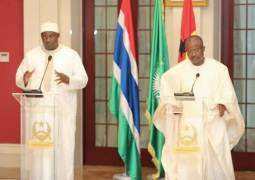
Despite diplomatic appeals and months of outreach, the students say their situation has worsened prompting questions about the strength and fairness of bilateral ties between the two nations.
Essa Jammeh, a Gambian Islamic Studies and Arabic language student in Mauritania, alongside the President of the Gambian Student Association in Mauritania Ousman Badjie, have sounded the alarm over what they called a deepening humanitarian crisis faced by Gambians living in the North African country.
“We are tired, frustrated, and broken,” Jammeh said in a recent interview. “Every day, Gambians are arrested, detained, and harassed by security forces here in Mauritania. Even women and children are not spared.”
The situation, according to Jammeh and other students, has deteriorated significantly since March 2025, following the Mauritanian government’s strict enforcement of residential permits for foreign nationals. While Mauritanians in The Gambia continue to enjoy freedom, dignity, and peace, the same cannot be said for Gambians in Mauritania, many of whom live in constant fear.
“Diplomacy should be reciprocal,” Jammeh advised. “We have applied for residential permits for months, with no success. We’ve queued for days under the sun hoping to receive the free permits supposedly offered by the Islamic Ministry to students, but all in vain. We cannot continue hiding in our houses to escape arrest.”
According to Ousman Badjie, the Student Association President, many students were neither informed nor warned before the crackdown began. “One morning, security officers flooded the streets. They began arresting anyone without a valid residence permit or a recently issued entry visa, sometimes as minor as three months expired,” Badjie said.
What’s more concerning, he added, is that even when embassy staff and student association leaders like he tried to intervene, their access is often denied particularly at a known deportation center called Robenneh Diz, locally referred to as “TAP Number Ten.”
“At that station, not even embassy officials are allowed in,” Badjie said. “Deputy Ambassador Saikouba Jarju and Executive Member Master Kinteh have been working day and night trying to locate and release detained Gambians, but many are held for days without food or water.”
The plight of minors is especially alarming. Badjie reports that even Talibeh (Qur’anic students) as young as seven or eight have been picked up by police. “This is a gross violation of human rights,” he added.
In April, The Gambia’s minister for Foreign Affairs visited Mauritania and reached an agreement with Mauritanian authorities that Gambians could use national identity cards to apply for residence permits. In response, Gambian immigration officials traveled to Mauritania to issue ID cards. However, according to students, that agreement was later reversed. “They now say ID cards are not accepted. We must have passports. It’s one obstacle after another,” Jammeh said.
The students are now calling on The Gambia’s government, human rights organisations, and ECOWAS to urgently intervene.
“Are Mauritanians in our homeland treated like this?” Jammeh questioned. “We are not asking for special treatment. We are asking to be treated with the same dignity and fairness that Mauritanians enjoy in The Gambia.”
Read Other Articles In Headlines



